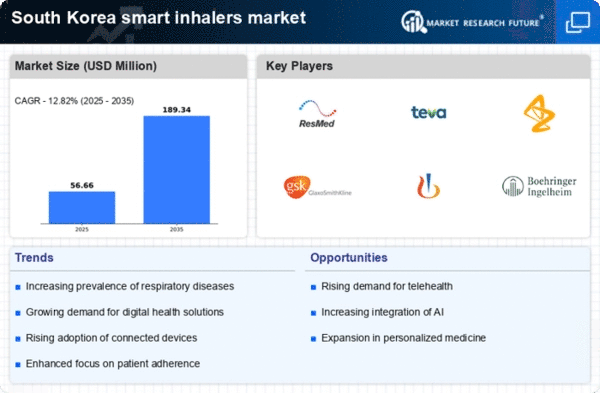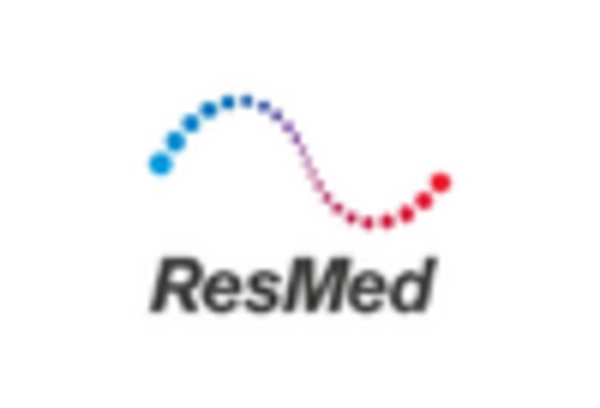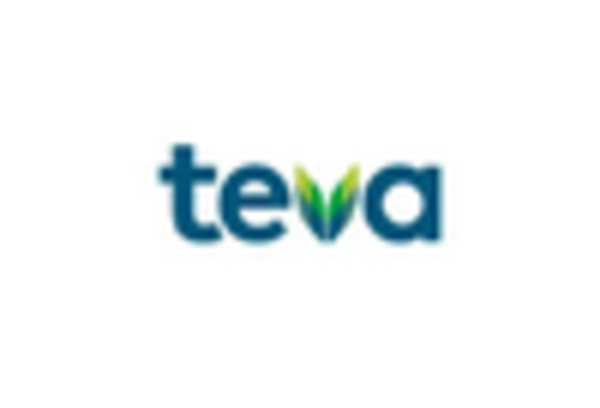Government Initiatives and Funding
Government initiatives and funding aimed at improving healthcare infrastructure are playing a crucial role in the smart inhalers market. In South Korea, the government has been actively promoting the development and adoption of digital health technologies, including smart inhalers. Financial support and grants for research and development in this sector are becoming more common, encouraging companies to innovate and bring new products to market. For instance, the South Korean government has allocated substantial budgets to enhance healthcare technology, which includes smart inhalers. This financial backing not only stimulates market growth but also fosters collaboration between public and private sectors. As a result, the smart inhalers market is likely to benefit from increased investment, leading to the development of more effective and user-friendly devices that cater to the needs of patients with respiratory conditions.
Shift Towards Personalized Medicine
The shift towards personalized medicine is emerging as a key driver for the smart inhalers market. In South Korea, there is a growing recognition of the need for tailored treatment approaches that consider individual patient characteristics, including genetic factors and lifestyle. Smart inhalers facilitate this shift by enabling healthcare providers to monitor patient responses to treatment in real-time and adjust therapies accordingly. This personalized approach not only enhances treatment efficacy but also improves patient satisfaction. As the healthcare landscape evolves towards more individualized care, the demand for smart inhalers is likely to increase. The ability of these devices to collect and analyze data on patient usage patterns and medication effectiveness positions them as essential tools in the transition towards personalized medicine, thereby driving growth in the smart inhalers market.
Technological Integration in Healthcare
The integration of advanced technologies in healthcare is significantly influencing the smart inhalers market. In South Korea, the adoption of digital health solutions, including mobile applications and telemedicine, is on the rise. This trend is supported by government initiatives aimed at enhancing healthcare accessibility and efficiency. Smart inhalers, equipped with sensors and connectivity features, allow for real-time data collection and patient monitoring. This technological advancement not only improves medication adherence but also facilitates better communication between patients and healthcare providers. As a result, the market is witnessing an influx of innovative products that leverage technology to enhance patient care. The potential for smart inhalers to integrate with existing health systems and provide actionable insights is likely to drive their adoption further, making them a vital component of modern respiratory disease management.
Growing Awareness of Medication Adherence
There is a growing awareness of the importance of medication adherence among patients and healthcare providers in South Korea, which is driving the smart inhalers market. Non-adherence to prescribed medication regimens is a significant challenge in managing chronic respiratory diseases. Smart inhalers address this issue by providing features such as reminders, usage tracking, and data sharing with healthcare professionals. This heightened focus on adherence is supported by educational campaigns and initiatives aimed at informing patients about the consequences of non-compliance. As patients become more aware of the benefits of using smart inhalers, the demand for these devices is expected to rise. The smart inhalers market is likely to expand as healthcare systems increasingly recognize the value of technology in improving patient adherence and overall health outcomes.
Rising Prevalence of Respiratory Diseases
The increasing incidence of respiratory diseases in South Korea is a primary driver for the smart inhalers market. Conditions such as asthma and chronic obstructive pulmonary disease (COPD) are becoming more prevalent, affecting a significant portion of the population. According to health statistics, approximately 5.5 million individuals in South Korea are diagnosed with asthma, which translates to around 11% of the population. This growing patient base necessitates innovative solutions for effective disease management, thereby propelling the demand for smart inhalers. These devices offer enhanced monitoring and adherence features, which are crucial for managing chronic respiratory conditions. As healthcare providers seek to improve patient outcomes, the smart inhalers market is likely to experience substantial growth, driven by the need for advanced therapeutic options that cater to the rising number of patients with respiratory ailments.
















